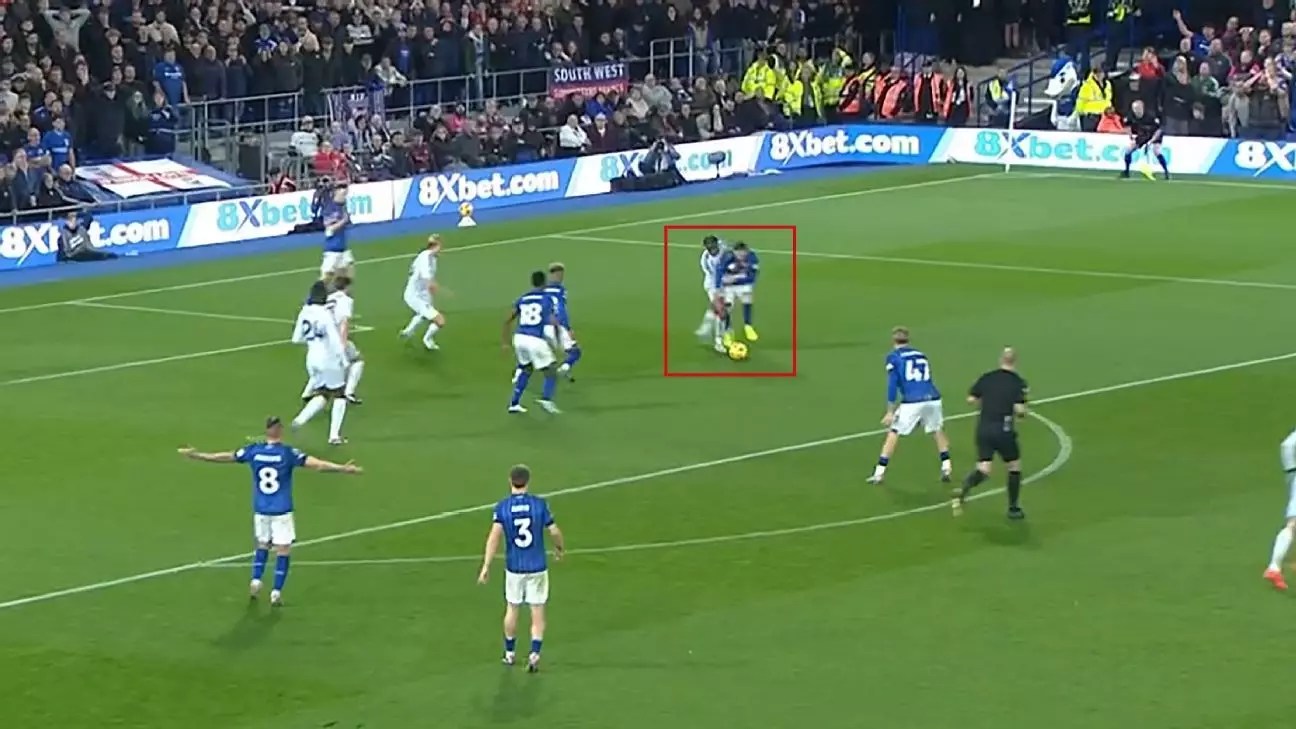The world of football has long been marred by disputes concerning officiating decisions, but recent controversies surrounding the Video Assistant Referee (VAR) system have heightened tensions within the sport. Ipswich Town’s chairman Mark Ashton has voiced his frustration with VAR following a pivotal match against Leicester City, highlighting an incident in which his team was denied what he considered a clear penalty. Ashton’s declaration of “injustice” raises significant questions about the functioning and consistency of VAR, as well as the broader implications for clubs that do not fall under the prestigious banner of football’s elite.
In the 77th minute of the match, Ipswich Town was leading 1-0 when an aggressive challenge by Leicester’s Fatawu Issahaku on Conor Chaplin went unpunished, despite it occurring within the penalty area. Referee Tim Robinson’s decision not to award the penalty turned out to be a pivotal moment in the match, ultimately contributing to a 1-1 draw. This incident not only impacted the game’s outcome, but it also left Ashton visibly enraged, prompting him to reach out to Howard Webb, the chief refereeing officer, in hopes of discussing the potential shortcomings of VAR after the game.
Ashton’s Stance: An Emotional Investment
As a man who openly professes his loyalty to Ipswich Town, Ashton’s reaction is rooted in genuine concern for the welfare of the team and its fans. He articulated this sense of urgency in his comments to BBC Suffolk, where he expressed a desire for transparency and accountability in the officiating process. Reflecting on his relationship with Webb, he shared a deep-seated frustration over the current implementation of VAR and hinted at potential ramifications for speaking too openly. “I live in a world where if I say too much, I’ll be put on a charge,” he explained, indicating the precarious balance he must maintain as a club chairman voicing legitimate grievances.
Ashton’s criticism extended beyond the single incident against Leicester. He pointed out that Ipswich has faced multiple VAR decisions that have not favored them this season, mentioning key moments against teams like Manchester City and Everton where the inconsistencies of the system became painfully evident. His insistence on the need for “consistency” in officiating highlights a significant issue within the realm of VAR: the varied application of rules and interpretations, which can lead to an overall confusing experience for clubs and fans alike.
While Ashton stopped short of outright accusing referees of bias toward larger clubs, his remarks suggested a lingering suspicion regarding the favoritism that may emerge in high-stakes matches. This topic of conversation is not new in football; many smaller clubs have historically echoed concerns about the disparity between how decisions are made in favor of elite clubs compared to their own. Ashton’s desire to see statistics on officiating decisions reflects a growing call for data-driven inquiries into the refereeing process. Observing, interpreting, and acting on those statistics could play a pivotal role in correcting systemic issues seen within officiating today.
The aftermath of the Leicester City game has left Ipswich Town grappling with broader questions about the functionality of VAR and its impact on the game. As Ashton stated, the current system requires scrutiny, discussion, and potentially significant reform. With Ipswich not receiving adequate explanations for the lack of VAR intervention during what Ashton referred to as a “stonewall penalty,” the chairman has vowed to continue pressing for answers from the league’s administration, showing a commitment to accountability that is vital for the integrity of the sport.
Ultimately, the collective experiences of clubs like Ipswich Town encapsulate a deeper dilemma within the footballing world regarding VAR. From understanding its practicalities to refining its implementation, it is imperative that football administrators listen to clubs outside of the traditional elite. In order to ensure fairness and consistency across the board, the footballing community must engage in meaningful discussions regarding the future of officiating and the controversial use of technology in the beautiful game.


Leave a Reply